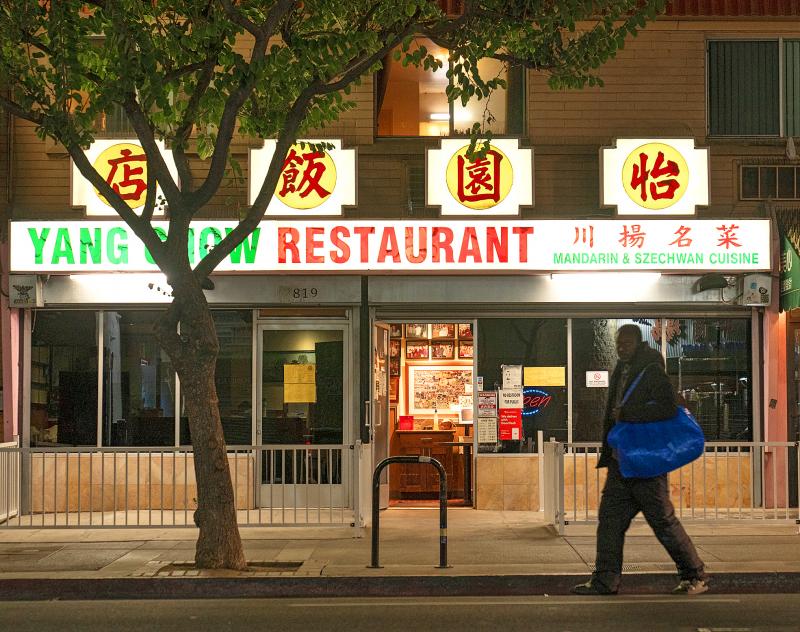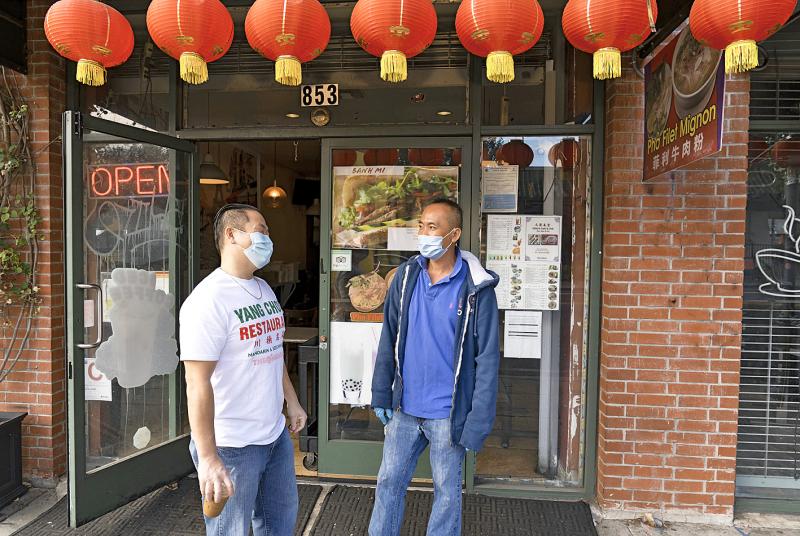As COVID-19 spread throughout the US, bigotry toward Asian Americans was not far behind, fueled by the news that the virus first appeared in China.
Some initial evidence suggested the virus began in bats, which infected another animal that may have spread it to people at one of Wuhan, China’s “wet markets.” Such markets sell fresh meat, fish and vegetables, and some also sell live animals, such as chickens, that are butchered on site to ensure freshness for consumers.
The information quickly got distorted in the US, spurring racist memes on social media that portrayed Chinese people as bat eaters responsible for spreading the virus, and reviving century-old tropes about Asian food being dirty. Fueling the fire, President Donald Trump repeatedly referred to COVID-19 as “the China virus.”

Photo: AP
“That old-school rhetoric that we eat bats, dogs and rats — that racism is still alive and well,” said Clarence Kwan, creator of the anti-racist cooking zine Chinese Protest Recipes. The speed with which such false stereotypes resurfaced during the pandemic is “a reflection of how little progress we’ve made,” Kwan said.
SERIOUS MISINFORMATION
In the Wuhan market where the virus is believed to possibly have originated, vendors also advertised wildlife for sale. Of the 33 samples from the market that tested positive for the coronavirus, officials say 31 were from the area where wildlife booths were concentrated. But wildlife and other “exotic” animals are not part of the modern mainstream Asian diet, either in Asian countries or in the US.

Photo: AP
All of the misinformation has had serious consequences.
Stop AAPI Hate, a coalition of Asian American advocacy groups, issued a report in August stating that it had received more than 2,500 reports of hate and discrimination across the country since the group was founded in March, around the time the outbreak began to seriously worsen in the US. The group said it received data from 47 states, with 46 percent of the incidents taking place in California, followed by 14 percent in New York.
In addition, Asian American small businesses have been among the hardest hit by the economic downturn during the pandemic. While there was a 22 percent decline in all small business-owner activity nationwide from February to April, Asian American business-owner activity dropped by 26 percent, according to a study by the National Bureau of Economic Research.
Many businesses that survived have been subject to stigmatization, Kwan said. “Restaurants have been vandalized. As if the pandemic wasn’t hard enough, there’s this added threat to Asian businesses of this lingering hate.”
Conversations about the stigmatization of Asian food reached a crescendo this month when Philli Armitage-Mattin, a contestant on “MasterChef: The Professionals,” used the phrase “Dirty Food Refined” and the hashtag #prettydirtyfood in her Instagram bio, which described her as an Asian food specialist.
“In a year where Chinese and East Asian communities have essentially been blamed for the pandemic and chastised as ‘dirty,’ this type of narrative is completely unacceptable,” Kwan wrote on Instagram. Armitage-Mattin’s bio has since been changed and the London-based chef apologized on Instagram, while also insisting that she had never meant to insult anyone.
“The way I mean food to be ‘dirty’ is indulgent street food; food that comforts you as in, ‘going out for a dirty burger,”’ she wrote.
But Kwan said especially in the current climate, such phrases can be dangerous.
“It was a very flippant, ignorant, tone-deaf way of talking about Asian food,” he said.
Racist rhetoric referring to Asian food as dirty or disease-laden dates back to the 1850s, said Ellen Wu, a history professor at Indiana University. Wu said the false notion that Chinese people eat rat or dog meat is rooted in the xenophobic fears of white workers who used Chinese immigrant workers as a scapegoat for their economic woes.
“To white Americans, these new immigrants were different in a threatening way, and there is fear of the ‘other,’ of difference,” said Wu, who is Asian American.
English professor Anita Mannur of Miami University said the current crisis reminds her of racist cartoons from the late 1800s that advertised for rat poison by picturing a Chinese man about to eat one of the rodents.
Mannur, who is Indian American, said other persistent false narratives such as that Chinese American neighborhoods or Chinatowns are dens of vice send the message that Asian people are less civilized, and do “very immediate damage.”
“People have had their houses graffitied with things like ‘Dog eaters live here,’” she said. “People are beaten up and spat on. People are told to go back to China.”
PRANK CALLS
Benny Yun, owner of the Yang Chow restaurant in Los Angeles’ Chinatown district and two other locations in Southern California, said even though his businesses have survived the pandemic, they get prank calls almost daily asking if they have dog or cat on the menu or impersonating a thick Asian accent.
“The worst part is if they realize you speak perfect English, then they just give you a random order and we prepare it and they don’t even come to pick it up. Waste of time and money,” Yun said.
For years, health inspectors have been accused of docking points from Chinese restaurants for employing traditional cooking and presentation methods, such as hanging roast duck in the front window. The common yet scientifically disproven claim that MSG causes illness made the Chinese food flavor enhancer highly unpopular in the 1970s, forcing many Asian American restaurants to eliminate it from their kitchens.
Kwan said it is important for Asian Americans to protest the way they are being treated; to push back against the latest onslaught of bias and racism by continuing to unabashedly celebrate their food and culture.
“We don’t have to change,” he said. “We can live, breathe and eat exactly the way we do without having to adapt to white supremacy, to the white gaze, to whiteness. We can be proud of our culinary heritage.”

June 2 to June 8 Taiwan’s woodcutters believe that if they see even one speck of red in their cooked rice, no matter how small, an accident is going to happen. Peng Chin-tian (彭錦田) swears that this has proven to be true at every stop during his decades-long career in the logging industry. Along with mining, timber harvesting was once considered the most dangerous profession in Taiwan. Not only were mishaps common during all stages of processing, it was difficult to transport the injured to get medical treatment. Many died during the arduous journey. Peng recounts some of his accidents in

“Why does Taiwan identity decline?”a group of researchers lead by University of Nevada political scientist Austin Wang (王宏恩) asked in a recent paper. After all, it is not difficult to explain the rise in Taiwanese identity after the early 1990s. But no model predicted its decline during the 2016-2018 period, they say. After testing various alternative explanations, Wang et al argue that the fall-off in Taiwanese identity during that period is related to voter hedging based on the performance of the Democratic Progressive Party (DPP). Since the DPP is perceived as the guardian of Taiwan identity, when it performs well,

A short walk beneath the dense Amazon canopy, the forest abruptly opens up. Fallen logs are rotting, the trees grow sparser and the temperature rises in places sunlight hits the ground. This is what 24 years of severe drought looks like in the world’s largest rainforest. But this patch of degraded forest, about the size of a soccer field, is a scientific experiment. Launched in 2000 by Brazilian and British scientists, Esecaflor — short for “Forest Drought Study Project” in Portuguese — set out to simulate a future in which the changing climate could deplete the Amazon of rainfall. It is

The Taiwan People’s Party (TPP) on May 18 held a rally in Taichung to mark the anniversary of President William Lai’s (賴清德) inauguration on May 20. The title of the rally could be loosely translated to “May 18 recall fraudulent goods” (518退貨ㄌㄨㄚˋ!). Unlike in English, where the terms are the same, “recall” (退貨) in this context refers to product recalls due to damaged, defective or fraudulent merchandise, not the political recalls (罷免) currently dominating the headlines. I attended the rally to determine if the impression was correct that the TPP under party Chairman Huang Kuo-Chang (黃國昌) had little of a